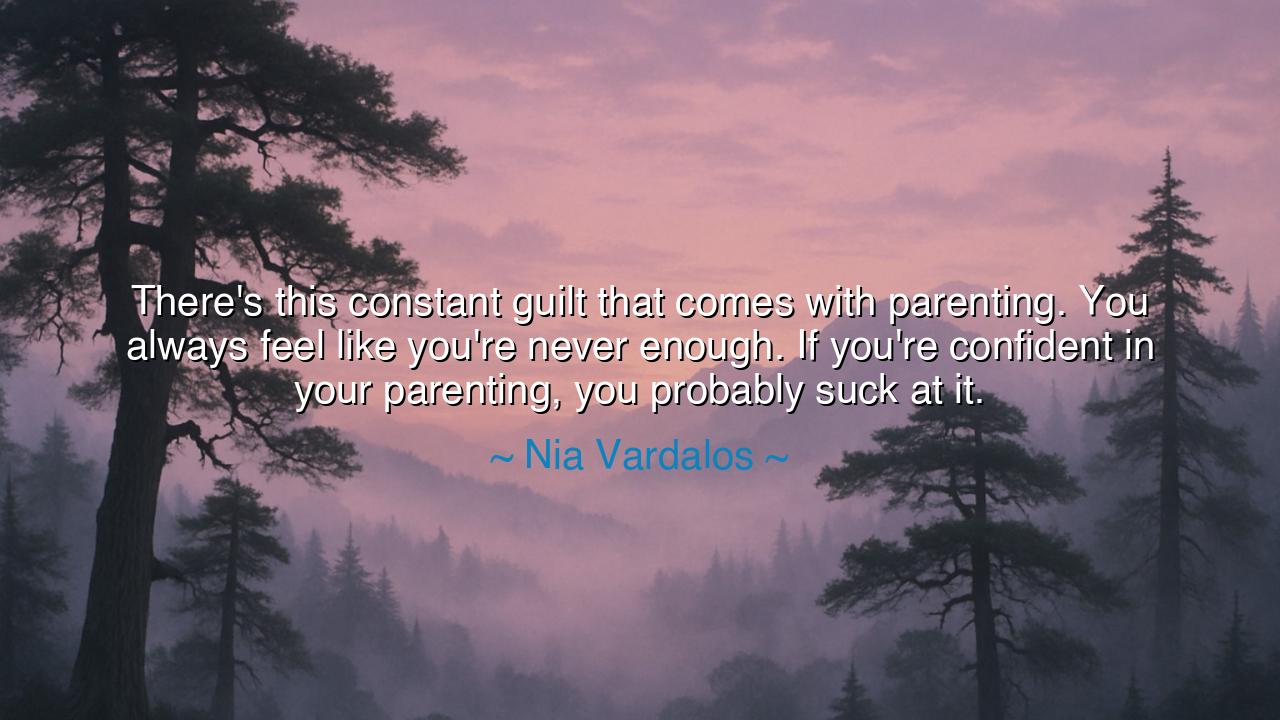
There's this constant guilt that comes with parenting. You
There's this constant guilt that comes with parenting. You always feel like you're never enough. If you're confident in your parenting, you probably suck at it.






Hearken, O seekers of wisdom, to the voice of Nia Vardalos, who speaks with piercing honesty of the hidden shadows that accompany parenting. She unveils the subtle, relentless companion of every guardian: guilt. This is not the guilt of wrongdoing alone, but the deep, stirring awareness that no effort seems ever complete, that the heart and hands may labor ceaselessly, yet the measure of “enough” remains elusive. In her words lies an ancient truth: the path of raising another is never fully mastered, and those who walk it most earnestly are often most aware of their own imperfections.
The origin of this insight springs from the intimate arena of human experience, where the tender soul of a child meets the striving heart of the parent. Across the ages, sages and storytellers alike have chronicled the paradox of guardianship: that in the act of caring, guiding, and shaping, one encounters the endless reflection of one’s own limitations. Plato himself spoke of the virtues of moderation and vigilance, yet acknowledged that those who undertake the molding of young minds bear a weight that exceeds any ordinary measure, for it is a labor of the soul, not just of the body.
Vardalos’ observation—that if one is fully confident in one’s parenting, one may indeed be erring—echoes the cautionary tales of history. Consider Abigail Adams, who, though steadfast in raising her family amidst the turbulent birth of a nation, confessed in her letters to frequent doubts and fears of inadequacy. She nurtured her children while managing the vast affairs of a fledgling country, and yet her heart often ached with the sense that she was never sufficient. Here, in the reflections of both ancient and modern minds, we see the paradox: doubt and humility are not signs of failure but of profound engagement and love.
The emotional landscape of parenting is one of constant negotiation between aspiration and reality. The parent strives to instill virtue, courage, and compassion, yet the young are unpredictable, their hearts not yet tempered by experience. This is the crucible in which guilt is forged—not as a punishment, but as a mirror of one’s commitment. Vardalos reminds us that the discomfort of self-questioning is inseparable from the nobility of the task: to feel uncertain is to care deeply, to wrestle with one’s own inadequacy is to strive for true guardianship.
In the theater of life, this truth resonates beyond the domestic sphere. Leaders, teachers, and mentors, like parents, face moments when their confidence falters, when they perceive their guidance as insufficient. The emperor Marcus Aurelius, in his meditations, often reflected upon the weight of duty and the humility required to fulfill it. He understood that the acknowledgment of imperfection was the mark of a conscientious soul. So too does Vardalos’ reflection illuminate the timeless reality that self-doubt, far from being weakness, is a compass guiding toward thoughtful, compassionate action.
From this understanding emerges a practical lesson: embrace the guilt and doubt as natural companions of committed parenting. Recognize that feeling “never enough” is not a verdict of failure but a sign of profound engagement and love. Seek balance through reflection, dialogue with trusted allies, and the acknowledgment of small triumphs alongside challenges. Let the measure of your parenting not be the illusion of perfection, but the persistent striving for the well-being, virtue, and happiness of your children.
Moreover, let the ancient wisdom of storytelling guide modern hearts. Share your doubts, learn from your errors, and model for your children the nobility of humility. Teach them that striving in the face of uncertainty is itself a sacred act, that love tempered by vigilance is the greatest inheritance one can offer. In doing so, the parent transforms guilt from a burdensome shadow into a guiding light, illuminating the path for both guardian and child.
Thus, Vardalos imparts an enduring truth to all generations: parenting is a sacred paradox, demanding both courage and humility, certainty and doubt. Those who wrestle with their own insufficiency are, in fact, those who give themselves most fully to the task. Let this knowledge steady the hearts of guardians: the presence of guilt and uncertainty is not a mark of failing, but a testimony to the depth of care, the nobility of effort, and the timeless pursuit of raising a soul worthy of the world.






AAdministratorAdministrator
Welcome, honored guests. Please leave a comment, we will respond soon